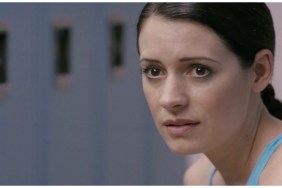Gael García Bernal as Ángel/Juan/Zahara
Fele Martínez as Enrique Goded
Daniel Giménez Cacho as Father Manolo
Lluís Homar as Sr. Manuel Berenguer
Javier Cámara as Paca/Paquito
Petra Martínez as Mother
Nacho Pérez as Young Ignacio
Raúl García Forneiro as Young Enrique
Francisco Boira as Ignacio
Juan Fernández as Martín
Alberto Ferreiro as Enrique Serrano
Roberto Hoyas as Camarero
Francisco Maestre as Padre José
Leonor Watling as Mónica
Summary:
Almodovar’s newfound audience will likely be polarized on whether the filmmaker’s most personal film is another masterpiece or a step backwards, but the maestro proves once again why he is Spain’s hottest and most controversial export.
Story:
Director Enrique Goded (Fele Martinez) is working on ideas for his next movie when a handsome young man (Gael Garcia Bernal) shows up, claiming to be his former childhood friend Ignacio. He gives Enrique a short story called “The Visit” about a drag queen named Zahara that plots to kill the Catholic school principal that molested him as a boy, but it raises Enrique’s suspicions about whether Ignacio is whom he says. He begins his own investigation into what happened at the school and in the years since then.
Critique:
Breaking out of the arthouse obscurity of his national peers, Pedro Almodovar became somewhat of a household name in the States after being nominated for a number of unexpected Oscars and becoming the first to win an Oscar for a foreign language screenplay for his last film Talk to Her. Where most filmmakers would try to continue on a more mainstream trajectory from there, Almodovar embraces his unpredictable mystique by telling a story that explores homosexuality and its connections to its “archenemy”, the Catholic Church.
Based on stories he heard while at school and in the decades since, Almodovar spent ten years finding the right take on Bad Education, although he has insisted that none of the characters are directly based on him, especially not the film director who takes advantage of his handsome but vulnerable star. Almodovar’s most recent fans may not appreciate the direction taken with Bad Education, but it’s a return to the thriller genre he first explored in Tie Me Up! Tie Me Down! Almodovar even reunited with cinematographer Jose Luis Alcaine for the first time since they made that groundbreaking film thirteen years ago, creating a visually stunning noir tale in the Hitchcock vein, rich with story and characters.
Once again, Almodovar uses a movie within a movie storytelling device to its fullest by cutting between the present and the past so fluidly that one never knows what is real, what is Enrique’s movie and what is Ignacio’s short story. In a nutshell, Enrique and Ignacio were school friends who bonded over movies, but when they begin exploring their sexuality together, the school’s principal, who has been secretly molesting Ignacio, expels Enrique in order to separate the two friends. To go further into the story could potentially ruin the many twists and surprises as Enrique begins to uncover the truth about what happened since he last saw Ignacio, but needless to say, Bad Education may be Almodovar’s richest narrative yet.
In his past work, Almodovar paid loving tribute to women-taking into account that the ones in Talk to Her were comatose-but the fairer sex is nowhere to be found in his latest film. Instead, Almodovar takes a cue from Shakespeare by having an almost all-male casts with a number of the key roles being played by Mexican actor Gael Garcia Bernal, already reveling in acclaim for playing a young Che Guevara in Walter Salles’ The Motorcycle Diaries. The very different characters played by Bernal allows him to show off his wide spectrum of acting skills, but he also takes a number of risks in the parts, although after Y Tu Mama Tambien and The Crimes of Father Amaro, the young star should be used to controversy. The younger female fans that swoon over Bernal’s charm and looks might get a bit freaked out by his rather graphic homoerotic scenes or the fact that he makes a decent looking woman as the junkie drag queen Zahara.
The rest of the equally talented cast consists of Almodovar regulars and rookies, all playing second fiddle to Bernal’s amazing screen presence. Most notably, Almodovar’s Talk to Her stars return with Martinez playing a subtler character and Javier Camera going to the other extreme with a small but amusing role as Zahara’s drag queen friend.
Anyone uncomfortable with even the thought of naked men or homosexuality might be a bit put off by the amount of both in Bad Education, although one can’t hold it against Almodovar for finally exploring his own sexuality. (The MPAA corroborated any accusations of homophobia by giving the film an NC-17 rating for it.) On another level, Bad Education acts as Almodovar’s not too subtle indictment against the Catholic Church and the blind eye it turns to the abuse of young boys by the clergy. This aspect of the film might polarize and discomfort audiences more than the overt homosexuality, but it provides another level of terror that Hitchcock could never have possibly imagined.
As a whole, Bad Education is not so much a departure or a tangent for Almodovar, but it shows a more personal side of a director who constantly proves that you should never assume what to expect from his films.
Bad Education opens in New York and Los Angeles on Friday.










